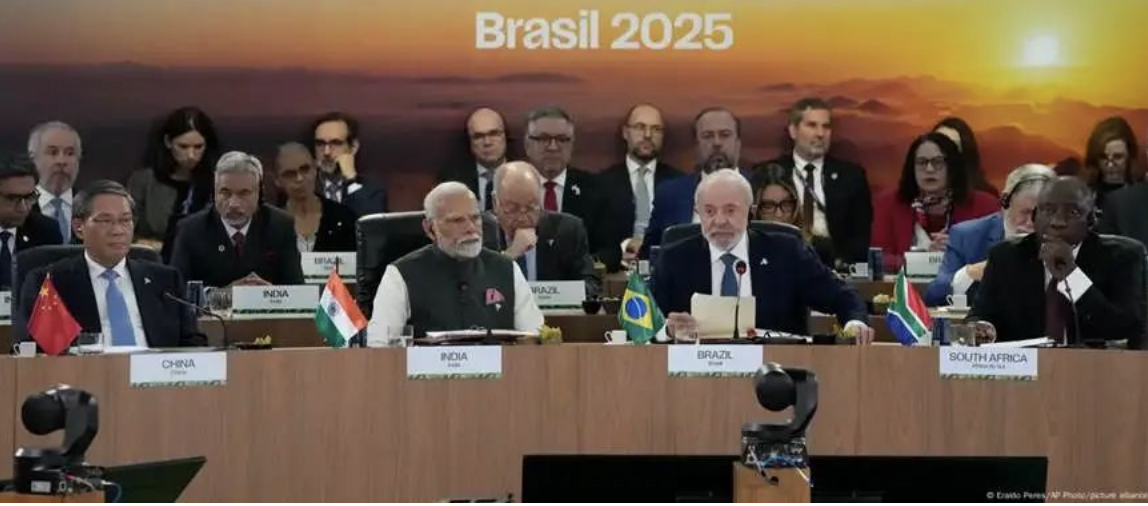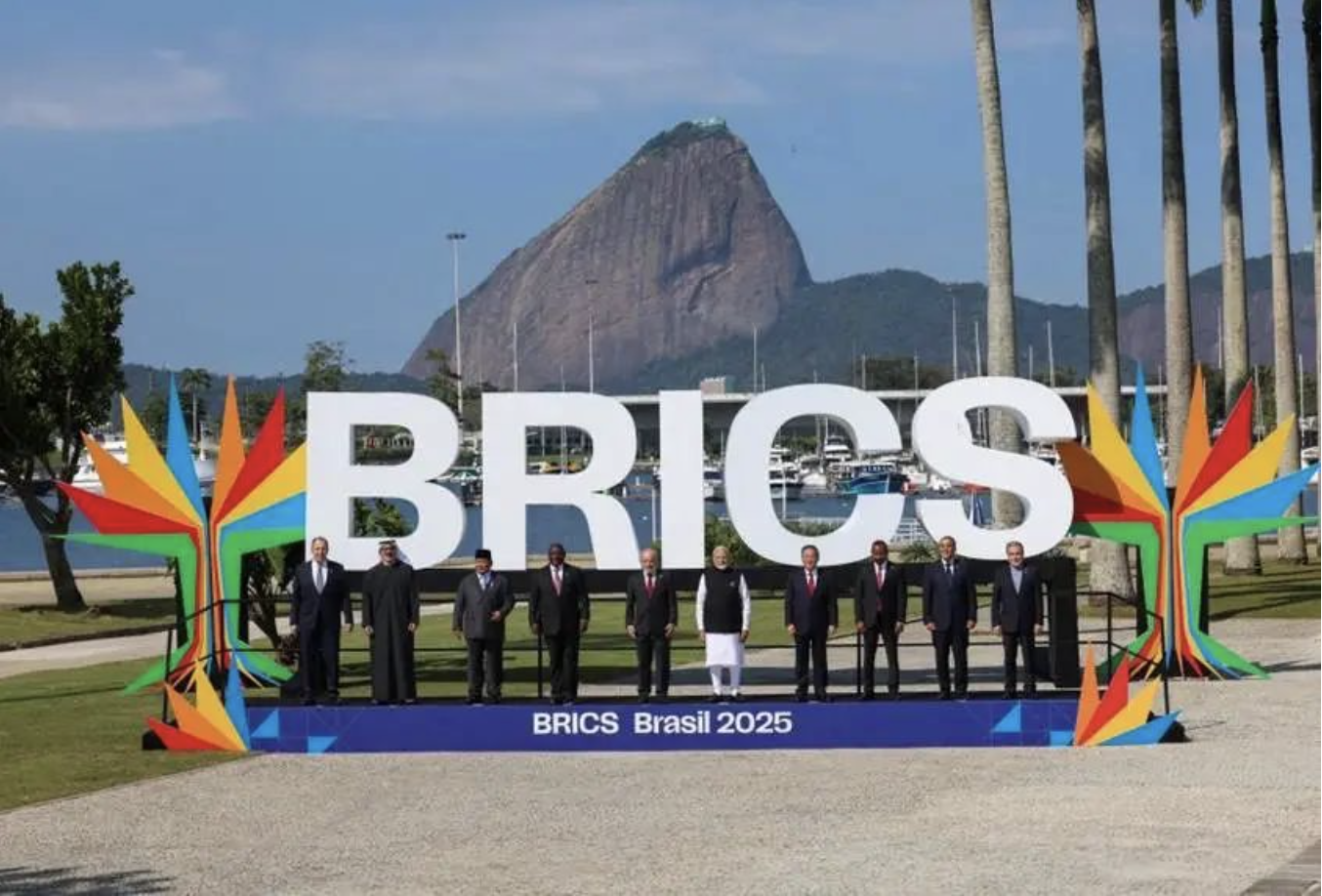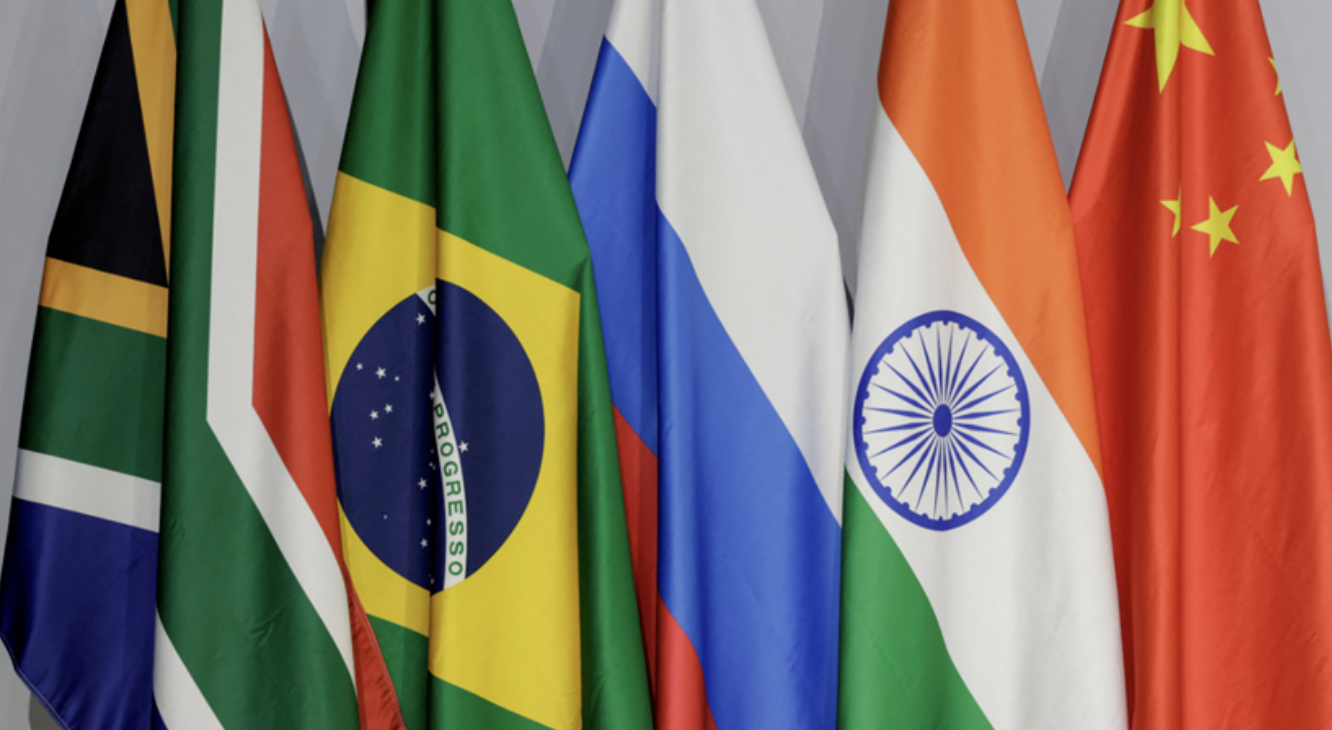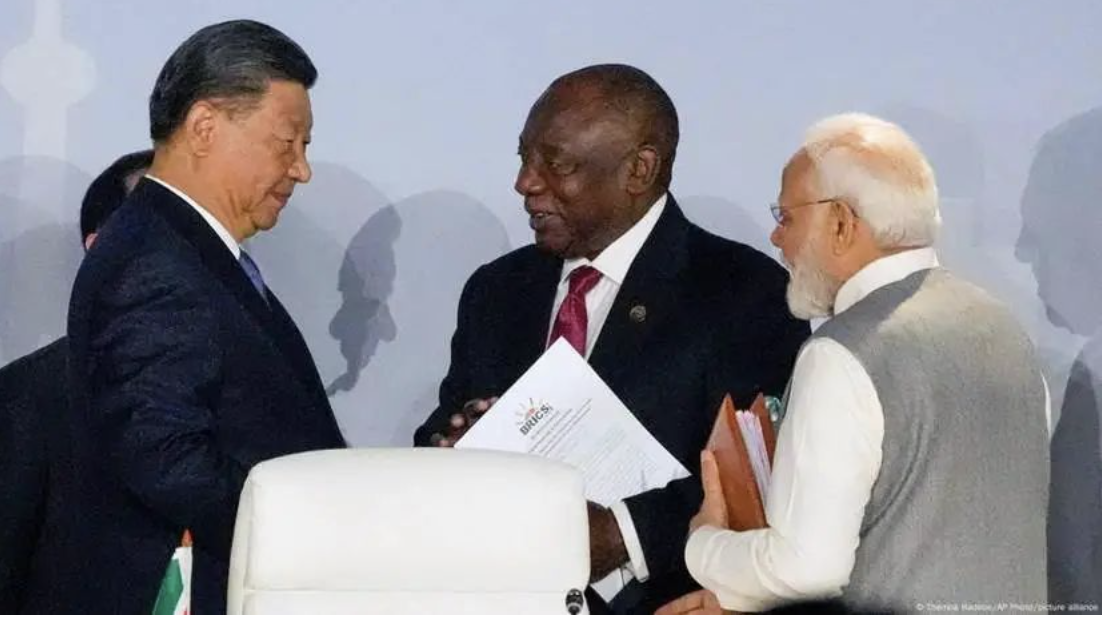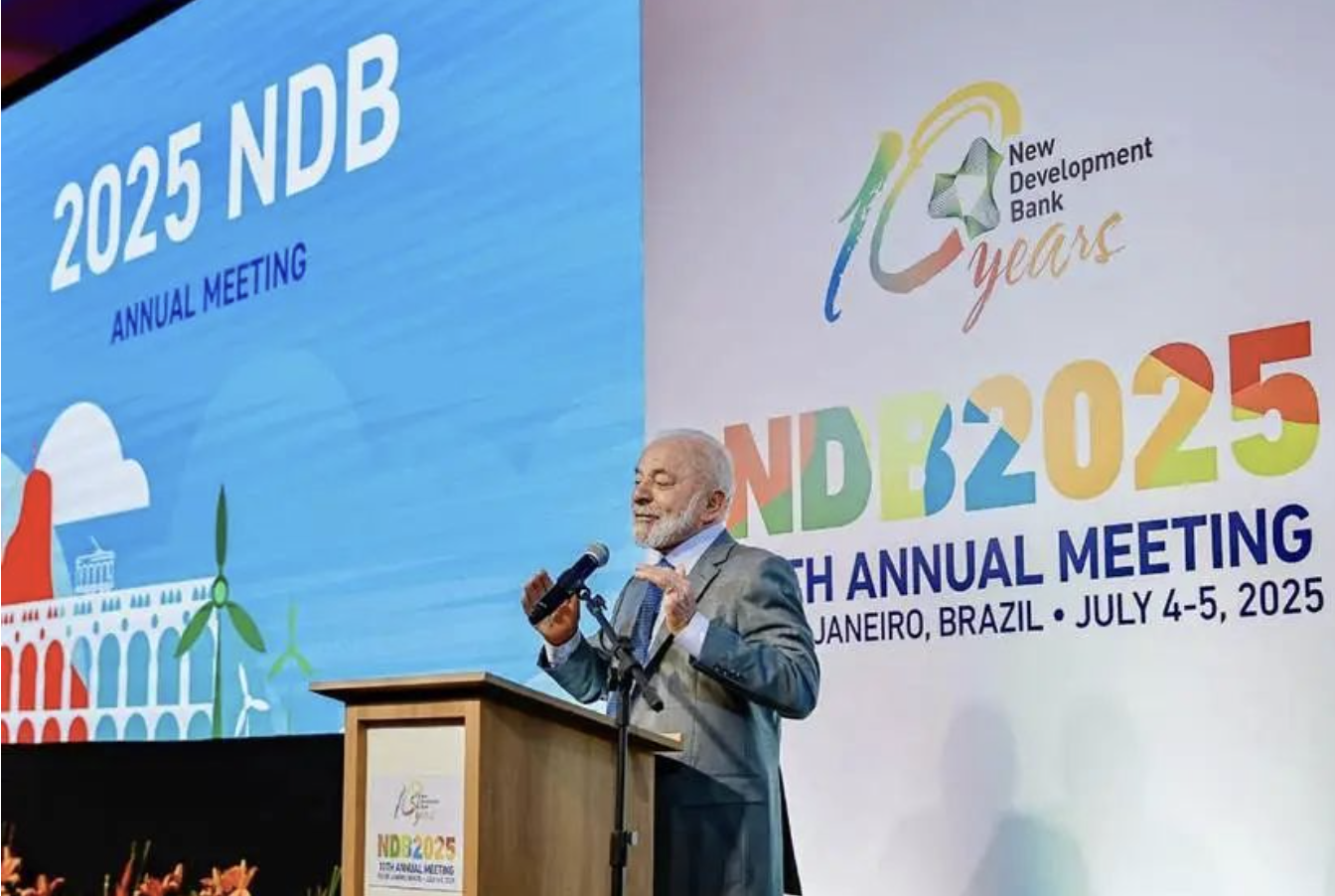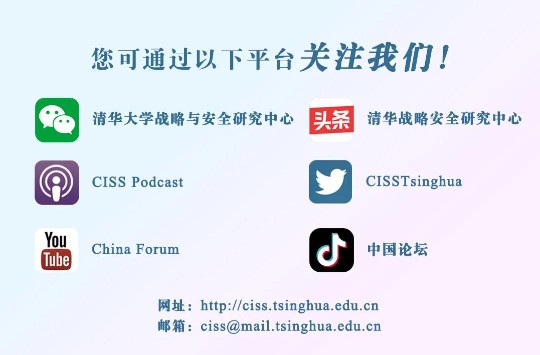(图片来源:Associated Press) 一、随着新成员的加入,金砖合作正从“高速增长”阶段迈向“高质量发展”阶段,强调务实合作、机制创新与治理效能的提升。这不仅扩大了金砖的全球影响力,也对内部协调与机制建设提出更高要求。在新格局下,实现从“数字扩张”到“内涵提升”的转变,将是金砖迈向更具全球引领力的重要契机。 1.扩员后,金砖正在从“部分新兴国家俱乐部”向“全球南方代言人”转型,具备与G7等西方机制进行对等制度性对话的资格与能力,增强了在联合国、G20、IMF等全球机制改革中的集体发声权与谈判筹码,“金砖机制”的全球治理话语权与影响力持续增强。 A greater BRICS, with enhanced appeal, stronger representativeness, and broader geographic reach, is reshaping the global political and economic landscape. The growing diversity of BRICS further underscores its commitment to inclusivity and its role as a true representative of the Global South. Greater BRICS cooperation has highlighted the development priorities of emerging economies and fostered dialogue on equal footing. It reflects the growing consensus that effective multilateral solutions must involve a broader range of voices, especially those previously excluded. In practice, BRICS has offered a hopeful and practical development model for developing countries through initiatives focused on infrastructure investment, technology transfer and financial integration. For many Global South members facing infrastructure challenges, food insecurity and climate vulnerabilities, BRICS offers much-needed support where others have fallen short. More importantly, BRICS is also a collective voice for fairness and justice in global governance. It advocates for shared progress, mutual respect and sovereign equality, while firmly opposing the formation of exclusive "small blocs." (July 07, 2025, “BRICS injects momentum into Global South solidarity, global certainty”, People’s Daily ) Many countries are drawn to the bloc for pragmatic reasons, seeking a multipolar world order less dominated by the West. They believe BRICS will amplify the voice of the Global South on the world stage. (July 08, 2025, “Why is Donald Trump so afraid of BRICS?”, Deutsche Welle ) New and aspiring joiners to the club have a mix of motivations, as chronicled by the Carnegie Endowment thinktank. For Egypt, which has struggled with dollar shortages and IMF programs for years, transactions in local currencies are attractive. For Indonesia, diversification of trade and diplomatic ties is a show of its long standing non-alignment policy. Nigeria, meanwhile, seeks economic ties with larger countries and a bigger regional role on the continent. For the UAE, the bloc is a way to further its regional influence. Saudi Arabia (invited but not yet accepted) has a similar view. According to Layla Ali at Gulf Research Center, both countries “see the BRICS summit as a strategic platform to expand their diplomatic and economic ties on a global scale.” (July 5, 2025, “BRICS in 2025”, The Polycrisis ) 2.新一轮扩员后,“金砖机制”合作基础的“资源互补性”增强,新成员如沙特、伊朗、阿联酋等在能源出口方面具有显著优势,而中国、印度则是全球主要的能源消费与制造大国,双方在能源、基础设施与供应链等领域存在高度的产业协同性与利益交汇点。在农业、绿色转型、数字技术等其他关键发展领域,金砖国家间也呈现出结构性互补态势。 The addition of major fossil-fuel producers may give the bloc more scope to challenge the dollar’s dominance in oil and gas trading by switching to other currencies, a concept referred to as de-dollarization. (July 04, 2025, “What Is BRICS, the G-7 Alternative Being Pushed by China?”, Bloomberg ) The BRICS members account for over half of the world's population, nearly 30 percent of global GDP, and more than 50 percent of global economic growth. This signifies the historic shift of the Global South from the periphery to the center of the international arena. The growing diversity of BRICS further underscores its commitment to inclusivity and its nature as a representative of the Global South. With notable advantages in market, resources, industries and other factors, BRICS countries should play an active role in spearheading development cooperation, unlock the growth potential in emerging areas, and continue to explore new space for mutually beneficial cooperation. (July 07, 2025, “Openness, inclusiveness and cooperation BRICS' solution to issues in volatile world”, China Daily ) 二、金砖吸引力上升的根源在于其相对公平、包容的发展理念日益成为全球南方国家的替代性选择。面对现行国际秩序中长期存在的结构性不公,特别是在疫苗分配、债务重组与地缘博弈中被边缘化,越来越多发展中国家倾向于投向更具平权色彩的平台。金砖机制所倡导的互利共赢、多极合作,为这些国家提供了突破传统秩序束缚的新路径。 1.金砖合作理念具有共融性,金砖机制主张平等与非干涉原则——金砖国家倡导相互尊重、不干涉内政的合作模式,契合“全球南方”国家对自主发展的需求。这种理念与西方主导的、以文化霸权为基础的国际秩序形成鲜明对比。 The NDB offers loans, guarantees, and other financial mechanisms to support private projects that contribute to sustainable development and building out infrastructure. It is intended to offer more flexibility, greater equality among shareholders, and easier access to funds as opposed to the World Bank, which spreads its attention across 190 members. (July 07, 2025, “Openness, inclusiveness and cooperation BRICS' solution to issues in volatile world”, China Daily ) (图片来源:The Diplomat) Importantly, BRICS endorsed a bigger role for the Global South by calling for “greater and more meaningful participation and representation” of Emerging Markets and Developing Countries, as well as Least Developed Countries, especially from Africa, Latin America and the Caribbean in global decision-making processes and structures. “We highlight the importance of the Global South as a driver for positive change, especially in the face of significant international challenges, including deepening geopolitical tensions, rapid economic downturns and technological changes, protectionist measures and migratory challenges. We believe BRICS countries continue to play a pivotal role in voicing the concerns and priorities of the Global South, as well as in promoting a more just, sustainable, inclusive, representative and stable international order based on international law,” it said. (July 09, 2025, “At Rio, the BRICS Projected the Voice of the Global South”, The Diplomat ) BRICS countries have also established an extensive and thickening latticework of intergovernmental cooperation. In addition to founding dedicated institutions such as the Contingent Reserve Arrangement (CRA), created in 2014 with an initial funding of $100 billion, and the New Development Bank (NDB) established in 2015 with an initial subscribed capitalization of $50 billion, the coalition has (like the G7 and G20 forums) embraced networked minilateralism, launching transnational partnerships and working groups on topics of shared interest from energy security to health, climate change, sustainable development, and technology transfer. BRICS avowedly seeks to challenge Western-dominated institutions of global economic governance, as well as to displace the U.S. dollar from its entrenched role in the world economy. Many analysts therefore depict BRICS expansion as a watershed moment in the shift to a more egalitarian international system. (March 31, 2025, “BRICS Expansion and the Future of World Order: Perspectives from Member States, Partners, and Aspirants”, Carnegie Endowment For International Peace ) 2. 金砖机制所倡导的新型经济与技术合作模式具有独特吸引力。当前,金砖国家市场规模不断扩大,贸易与投资潜力日益凸显。通过新开发银行等机制性平台,金砖合作在基础设施、绿色转型、数字经济等领域持续推进,成为推动全球南方可持续发展的关键力量。 One of the more tangible outcomes was the proposal for an institution inspired by the World Bank’s Multilateral Investment Guarantee Agency. This new institution would be aimed at facilitating infrastructure and development investment across the Global South by providing investment guarantees to reduce political risk. Still in its early phases, the plan signals the BRICS group’s continued interest in building parallel or complementary institutions to existing Western-dominated frameworks. It also signals an interest in providing tools for riskier developing countries to attract needed investment, and there is no indication that these guarantees would be limited to investment from BRICS member countries. It has been presented as the BRICS Multilateral Guarantees initiative, which is likely to continue its development through 2025 and 2026. (July 8, 2025, “What really came out of this year’s BRICS summit?”, Atlantic Council ) (图片来源:Getty ) 三、非洲国家在加入金砖机制的过程中,不仅是参与者,更是南南合作叙事的重要塑造者。以“非洲身份”为桥梁,非洲国家有望在粮食安全、气候治理、数字转型等议题上推动更具包容性的全球发展议程。 1.长期以来,非洲在联合国安理会、世界银行、IMF等国际机构中代表性不足,导致其在债务谈判、贸易规则、技术标准等关键议题中处于被动地位。金砖机制不设政治门槛,不设治理模板,为非洲国家提供了更平等、更宽容、更灵活的合作平台,提升了非洲国家在全球治理体系中的代表性。 South Africa, the smallest economy of the original five BRICS countries, sees the coalition as an important platform to amplify its global influence. The group’s objectives align with Pretoria’s broader goal of promoting a multipolar world where developing countries play a greater role in shaping international governance. BRICS allows South Africa to push for reforms in institutions such as the UN Security Council, the IMF, and the World Bank, while advocating fairer representation of African and Global South nations. (March 31, 2025, “BRICS Expansion and the Future of World Order: Perspectives from Member States, Partners, and Aspirants”, Carnegie Endowment For International Peace ) The BRICS countries are representatives of major developing countries, and Africa is the continent with the largest concentration of developing countries. The rapid economic growth of the two countries together constitutes the collective rise of the "global South" since the 21st century. The two expansions of the BRICS summit mechanism took Africa as an important direction, and the "BRICS Plus", "Friends of BRICS" and New Development Bank mechanisms are also committed to building a broader partnership with African countries. After the expansion of BRICS membership, the African members and partners participating in BRICS cooperation have become more diverse, and the ability of "greater BRICS cooperation" to boost Africa's long-term economic growth has also been further enhanced. (May 9, 2025, “‘The Greater Brics Cooperation’ from an African Perspective”,International Cooperation Center ) 2. 气候正义、数字主权、发展权保障、债务重组等议题,均是非洲国家与其他南方国家的共性关切。非洲的参与能够为金砖提供更加鲜明的“全球南方立场”,推动从发展诉求联结到制度共建,实现全球治理观念从“西方中心论”向“多极协商论”的深层次转化。 Trade and investment are central to BRICS activities as well. As BRICS expands, South Africa wants to position itself as a gateway to Africa, particularly within the African Continental Free Trade Area. The addition of Ethiopia and Egypt as BRICS members strengthens Africa’s presence in the group, opening opportunities for deeper regional economic cooperation. South Africa hopes to attract more investment from BRICS partners, particularly in manufacturing, digital technology, and green energy. (March 31, 2025, “BRICS Expansion and the Future of World Order: Perspectives from Member States, Partners, and Aspirants”, Carnegie Endowment For International Peace ) (图源:Associated Press ) Ethiopian Prime Minister Abiy Ahmed underscored Ethiopia’s primordial interest in BRICS as an attractive multilateral vehicle to advance multiple national objectives, including infrastructure investment, manufacturing, and climate resilience. As with many other countries in the Global South, Ethiopia views BRICS as a platform that promotes economic cooperation and multipolarity, offering an alternative economic and political bloc that is not dominated by a single superpower as well as a forum where its interests and priorities may be respected and upheld. Indeed, the BRICS alliance offers Ethiopia a wealth of opportunities. (March 31, 2025, “BRICS Expansion and the Future of World Order: Perspectives from Member States, Partners, and Aspirants”, Carnegie Endowment For International Peace ) 四、金砖扩员在提升代表性与影响力的同时,也加剧了成员间政治制度、发展水平与外交立场的差异,增加了形成共识的难度。为应对这一挑战,金砖机制可推动“分层合作、聚焦共识”策略,即在气候、能源、发展融资等低敏感领域优先开展务实合作,逐步扩大共识基础。同时,应加强机制建设,如设立常设协调机构、提升新开发银行治理效能,以制度化安排增强合作韧性与协调效率。 1. 有学者指出,随着成员国数量不断增加,金砖机制可能面临“集体行动困境”,即在缺乏强制性机制下,成员难以就公共目标形成一致行动。为应对此类挑战,金砖国家应推动议题分层、责任分工机制,提升合作的灵活性与针对性。同时,可借助新开发银行等平台强化执行能力,推动从“共识倡导”走向“规则协同”。通过机制创新与战略聚焦,金砖有望在多样性中凝聚合力、增强行动效能。 Other observers are more sanguine, pointing to the group’s heterogeneity—which will only increase as the coalition expands—and to the fact that most BRICS members and aspirants have no desire to create a world of rigid blocs. They may view the coalition as a useful platform and vehicle to pursue reformist aims, but they remain open to cooperation with Western countries (and other middle powers) on matters of common concern. (March 31, 2025, “BRICS Expansion and the Future of World Order: Perspectives from Member States, Partners, and Aspirants”, Carnegie Endowment For International Peace ) If the Brics is to avoid the fate of the G77 bloc of developing nations, which faded into irrelevance as its membership ballooned, it should focus on issues where it is credible, such as reform of global governance. The western-led postwar order may have passed — but so has the era of Third Worldism. (July 10, 2025, “The Brics lose their clout”, Financial Times ) Brics can only stay relevant and provide credible leadership in a fast-changing international order when it addresses its many inner contradictions. (July 8, 2025, “Brics is sliding towards irrelevance – the Rio summit made that clear”, The Conversation ) (图源:China Daily ) 2.特朗普政府推行的关税政策及全球保护主义抬头,严重冲击了全球多边贸易体系,发展中国家和金砖国家首当其冲。面对这一外部压力,金砖合作应加强贸易政策协调,推动建立更加包容、互利的南南贸易网络。 China's Minister of Finance Lan Foan said that with global economic growth momentum weakening and protectionism severely impacting developing countries, BRICS nations should uphold the BRICS spirit of openness, inclusiveness and win-win cooperation. He emphasized the need to strengthen solidarity and jointly build a fair and reasonable global governance system, while remaining steadfast in embracing an economic globalization that is universally beneficial and inclusive. (July 7, 2025, “BRICS Summit to ‘showcase rising voice of Global South’”, Global Times ) Progressing from formulating proposals to implementing them is a long road—and that’s where BRICS continues to struggle. It doesn’t help that the US president is threatening an additional 10 percent tariff on every country aligning with the BRICS agenda. But never in the history of BRICS have its members enjoyed such economic heft. The group could use this momentum to assert greater influence at the G20 meetings in South Africa this November, especially considering the United States’. (July 7, 2025, “Building BRICS”, Atlantic Council ) The BRICS summit in July 2025 will test the bloc's resolve to challenge U.S. economic hegemony. While risks like internal divisions persist, the long-term trajectory favors sectors aligned with BRICS's de-dollarization and green growth goals. (July 4, 2025, “BRICS Rising: Geopolitical Shifts and Investment Opportunities in Emerging Markets”, AIinvest ) 编辑:赵帅 审核:中国论坛